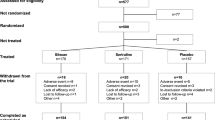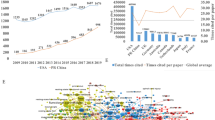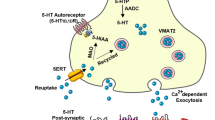Abstract
With the growing mechanistic understanding of higher brain functions like learning and memory, vigilance and social cognition, new pharmacological approaches for the treatment of psychiatric disorders arise. Substances used as neuroenhancers for the improvement of cognitive or emotional functions in healthy subjects might provide novel pharmacological opportunities in psychiatry. Intriguingly, drugs like modafinil, d-cycloserine or oxytocin have shown significant improvements in key symptoms in several psychiatric disorders. When used as augmentation strategies, they could either directly interfere with psychopathological impairments or improve response to other treatment modalities like psychotherapy or psychopharmacological drugs. While initial studies yielded promising results, further research on beneficial or adverse effects is required.
Similar content being viewed by others
References
Biederman J, Swanson JM, Wigal SB, Kratochvil CJ, Boellner SW, Earl CQ, Jiang J, Greenhill L (2005) Efficacy and safety of Modafinil film-coated tablets in children and adolescents with attentiondeficit/hyperactivity disorder: results of a randomized, doubleblind, placebo-controlled, flexible-dose study. Pediatrics 6:777–784
Bliss TV, Lomo T (1973) Long-lasting potentiation of synaptic transmission in the dentate area of the anaesthetized rabbit following stimulation of the perforant path. J Physiol 232:331–356
DeBattista C, Doghramji K, Menza MA, Rosenthal MH, Fieve RR (2003) Modafinil in Depression Study Group: Adjunct modafinil for the short-term treatment of fatigue and sleepiness in patients with major depressive disorder: a preliminary double-blind, placebo controlled study. J Clin Psychiatry 64:1057–1064
Deroche-Gamonet V, Darnaudery M, Bruins-Slot L, Piat F, Le-Moal M, Piazza PV (2002) Study of the addictive potential of modafinil in naive and cocaine-experienced rats. Psychopharmacology 161:387–395
Ditzen B, Schaer M, Gabriel B, Bodenmann G, Ehlert U, Heinrichs M (2009) Intranasal oxytocin increases positive communication and reduces cortisol levels during couple conflict. Biol Psychiatry 65:728–731
Fava M, Thase ME, DeBattista C (2005) A multicenter, placebo-controlled study of modafinil augmentation in partial responders to selective serotonin reuptake inhibitors with persistent fatigue and sleepiness. J Clin Psychiatry 66:85–93
Frye MA, Grunze H, Suppes T, McElroy SL, Keck PE Jr, Walden J, Leverich GS, Altshuler LL, Nakelsky S, Hwang S, Mintz J, Post RM (2007) A placebo-controlled evaluation of adjunctive modafinil in the treatment of bipolar depression. Am J Psychiatry 64:1242–1249
Hebb DO (1949) The organization of behavior: a neuropsychological theory. Wiley, New York
Heim C, Young LJ, Newport DJ, Mletzko T, Miller AH, Nemeroff CB (2009) Lower CSF oxytocin concentrations in women with a history of childhood abuse. Mol Psychiatry 10:954–958
Holderbach R, Clark K, Moreau JL, Bischofberger J, Normann C (2007) Enhanced long-term synaptic depression in an animal model of depression. Biol Psychiatry 62:92–100
Hurlemann R, Patin A, Onur OA, Cohen MX, Baumgartner T, Metzler S, Dziobek I, Gallinat J, Wagner M, Maier W, Kendrick KM (2010) Oxytocin enhances amygdala-dependent, socially reinforced learning and emotional empathy in humans. J Neurosci 30:4999–5007
Kosfeld M, Heinrichs M, Zak PJ, Fischbacher U, Fehr E (2005) Oxytocin increases trust in humans. Nature 435:673–676
Myrick H, Malcolm R, Taylor B, Larowe S (2004) Modafinil: preclinical, clinical, and post-marketing surveillance—a review of abuse liability issues. Ann Clin Psychiatry 16:101–109
Ninan PT, Hassman HA, Glass SJ, McManus FC (2004) Adjunctive modafinil at initiation of treatment with a selective serotonin reuptake inhibitor enhances the degree and onset of therapeutic effects in patients with major depressive disorder and fatigue. J Clin Psychiatry 65:414–420
Onur OA, Schlaepfer TE, Kukolja J, Bauer A, Jeung H, Patin A, Otte DM, Shah NJ, Maier W, Kendrick KM, Fink GR, Hurlemann R (2010) The N-methyl-d-aspartate receptor co-agonist d-cycloserine facilitates declarative learning and hippocampal activity in humans. Biol Psychiatry 67:1205–1211
Ressler KJ, Rothbaum BO, Tannenbaum L, Anderson P, Graap K, Zimand E, Hodges L, Davis M (2004) Cognitive enhancers as adjuncts to psychotherapy: use of d-cycloserine in phobic individuals to facilitate extinction of fear. Arch Gen Psychiatry 61:1136–1144
Swanson JM, Greenhill LL, Lopez FA, Sedillo A, Earl CQ, Jiang JG, Biederman J (2006) Modafinil film-coated tablets in children and adolescents with attention-deficit/hyperactivity disorder: results of a randomized, double-blind, placebo-controlled, fixed-dose study followed by abrupt discontinuation. J Clin Psychiatry 1:137–147
Thase ME, Fava M, DeBattista C, Arora S, Hughes RJ (2006) Modafinil augmentation of SSRI therapy in patients with major depressive disorder and excessive sleepiness and fatigue: a 12-week, open-label, extension study. CNS Spectr 2:93–102
Whitlock JR, Heynen AJ, Shuler MG, Bear MF (2006) Learning induces long-term potentiation in the hippocampus. Science 313:1093–1097
Xu L, Anwyl R, Rowan MJ (1997) Behavioural stress facilitates the induction of long-term depression in the hippocampus. Nature 387:497–500
Zobel I, Werden D, Linster H, Dykierek P, Drieling T, Berger M, Schramm E (2010) Theory of mind deficits in chronically depressed patients. Depress Anxiety 27:821–828
Acknowledgments
This article is part of the supplement ‘Personalized Psychiatry and Psychotherapy’. This supplement was not sponsored by outside commercial interests. It was funded by the German Association for Psychiatry and Psychotherapy (DGPPN).
Conflict of interest
The authors declare that they have no conflict of interest.
Author information
Authors and Affiliations
Corresponding author
Rights and permissions
About this article
Cite this article
Normann, C., Nissen, C. & Frase, L. Neuroenhancement strategies for psychiatric disorders: rationale, status quo and perspectives. Eur Arch Psychiatry Clin Neurosci 262 (Suppl 2), 113–116 (2012). https://doi.org/10.1007/s00406-012-0356-1
Received:
Accepted:
Published:
Issue Date:
DOI: https://doi.org/10.1007/s00406-012-0356-1




